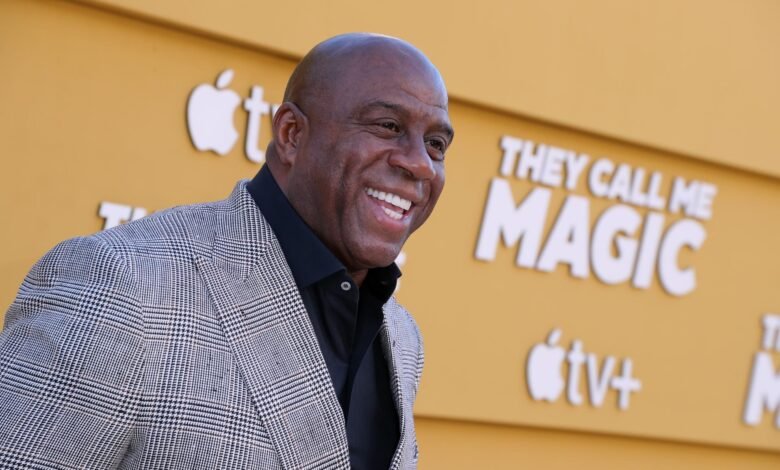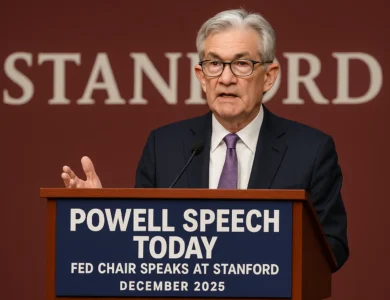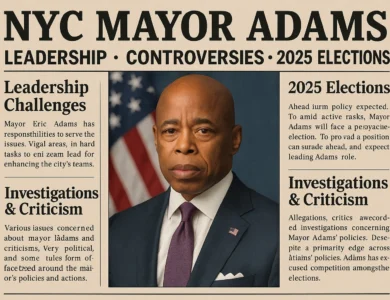
When Earvin “Magic Johnson” stepped onto the hardwood in 1979, nobody could have predicted the seismic shift he would bring to professional basketball. Standing at 6’9″ with the ball-handling skills of a guard and the vision of a chess master, Magic Johnson didn’t just play basketball—he revolutionized it. His infectious smile, no-look passes, and championship mentality transformed the Los Angeles Lakers into a dynasty and helped save the NBA from financial obscurity during one of its darkest periods.
The Magic Johnson NBA career spanned 13 remarkable seasons, during which he accumulated five NBA championships, three MVP awards, and countless memories that still resonate with basketball fans worldwide. But beyond the statistics and accolades lies something far more significant: Magic’s ability to change how the game was played, watched, and appreciated. He brought flair to fundamentals, made passing as exciting as scoring, and proved that basketball could be both competitive and entertaining.
This article explores the five greatest Magic Johnson moments that didn’t just define his legendary career but fundamentally altered the trajectory of professional basketball. From his unprecedented rookie performance to his emotional farewell, each moment represents a pivotal chapter in NBA history that continues to influence the game today.
1. The Rookie Championship Performance: Starting at Center in Game 6 (1980 NBA Finals)
The Unprecedented Challenge
Perhaps no single performance better encapsulates Magic Johnson’s greatness than his legendary showing in Game 6 of the 1980 NBA Finals. When Lakers center Kareem Abdul-Jabbar suffered a severe ankle injury in Game 5, the team faced an impossible situation. The Philadelphia 76ers were formidable opponents, and losing the team’s leading scorer seemed to spell disaster for Los Angeles.
What happened next would become the stuff of legend. The 20-year-old rookie Magic Johnson volunteered to start at center—a position he had never played professionally. Coach Paul Westhead took a chance on the young point guard, and Magic delivered what many consider the greatest Finals performance in basketball history.
The Historic Performance
Magic Johnson dominated every aspect of the game, recording 42 points, 15 rebounds, and 7 assists while playing all five positions throughout the contest. His versatility was on full display as he ran the fast break, posted up smaller defenders, and orchestrated the Lakers offense with the poise of a veteran. The Lakers won 123-107, securing the championship and announcing Magic’s arrival as a transformative talent.
This performance revolutionized how teams thought about positionless basketball—a concept that wouldn’t fully materialize in the NBA until decades later. Magic Johnson proved that basketball brilliance transcended traditional positions, paving the way for future versatile superstars like LeBron James and Giannis Antetokounmpo.
2. The Lakers-Celtics Rivalry Revival: Bringing Drama Back to the NBA
Saving the NBA from Obscurity
During the late 1970s, the NBA struggled with declining ratings, financial troubles, and a tarnished image. The league desperately needed stars who could capture America’s imagination. Enter Magic Johnson and Larry Bird, whose rivalry began in the 1979 NCAA Championship and exploded into something extraordinary at the professional level.
The Lakers-Celtics rivalry of the 1980s became must-watch television. Magic Johnson’s Lakers faced Bird’s Boston Celtics in three NBA Finals during the decade (1984, 1985, and 1987), each series showcasing contrasting styles and personalities. Magic represented Hollywood glamour and Showtime flash, while Bird embodied blue-collar grit and fundamental precision.
The Cultural Impact
These matchups transcended basketball, becoming cultural events that drew casual fans and established the NBA as premier entertainment. The 1984 Finals averaged 12.3 million viewers—a dramatic increase from previous years. Magic Johnson and Bird didn’t just compete; they told a compelling story that networks could market and fans could invest in emotionally.
This rivalry revolutionized how the NBA was marketed and consumed, establishing the blueprint for building star-driven narratives that the league still uses today. Without Magic Johnson’s charisma and championship success, the modern NBA as we know it might not exist.
3. The Junior Sky Hook: Defeating the Celtics in the 1987 Finals
The Defining Shot
Game 4 of the 1987 NBA Finals provided Magic Johnson with perhaps his most iconic individual moment. With the series tied 2-2 and the game knotted at 106 with seconds remaining, the ball found Magic in the left corner. Rather than attempting a standard shot, Magic Johnson elevated and released a running hook shot—later dubbed the “junior sky hook” in homage to Kareem Abdul-Jabbar’s signature move.
The shot sailed through the net with two seconds remaining, giving the Lakers a 107-106 victory. Los Angeles would win Game 5 to capture the championship, but it was Magic’s clutch shot that everyone remembered.
The Competitive Evolution
This moment showcased Magic Johnson’s evolution from facilitator to complete player. While his passing remained legendary, he proved capable of carrying the scoring load when necessary. The junior sky hook demonstrated his basketball IQ—recognizing the moment required him to shoot rather than pass.
This performance revolutionized expectations for point guards in the NBA. Magic proved that elite playmakers could also be elite scorers, influencing future dual-threat guards like Stephen Curry and Damian Lillard who balance facilitation with scoring prowess.
4. The 1992 Dream Team: Globalizing Basketball
Olympic Dominance
When Magic Johnson returned from his HIV retirement to join the 1992 Olympic Dream Team, he participated in what many consider the greatest basketball team ever assembled. Alongside Michael Jordan, Larry Bird, and other NBA legends, Magic helped dominate the Barcelona Olympics, winning by an average margin of 43.8 points.
Magic Johnson’s presence on the Dream Team was particularly significant. His announcement of his HIV diagnosis in November 1991 had shocked the world, and many questioned whether he should participate. But Magic’s inclusion and stellar performance sent a powerful message about living with HIV and helped reduce stigma globally.
The International Impact
The Dream Team revolutionized basketball’s global reach. Magic Johnson’s infectious personality and spectacular passes introduced millions of international fans to the NBA’s entertainment value. Countries that had little basketball tradition suddenly embraced the sport, leading to the international player influx that defines today’s NBA.
This moment fundamentally changed how basketball was perceived worldwide, transforming it from an American sport to a global phenomenon. Magic Johnson’s role in this transformation cannot be overstated—his style of play was universally appealing and helped establish the NBA’s international brand.
5. The 1991 HIV Announcement and Courageous Return
Facing the Unthinkable
On November 7, 1991, Magic Johnson held a press conference that stunned the sports world. He announced he had contracted HIV and would immediately retire from the NBA. At a time when public understanding of HIV/AIDS was limited and stigma was rampant, Magic’s announcement could have ended his public life.
Instead, Magic Johnson chose courage over silence. His openness about his diagnosis, combined with his determination to educate the public, revolutionized how America discussed HIV/AIDS. He became an advocate for safe practices and HIV education, using his platform to save lives.
The Legacy Beyond Basketball
Magic Johnson briefly returned to the Lakers in 1996, proving he could still compete at an elite level. But his true revolution was demonstrating that an HIV diagnosis wasn’t a death sentence. His longevity and health advocacy changed public perception and encouraged testing and treatment.
This moment revolutionized the intersection of sports and social issues. Magic Johnson showed that athletes could be powerful advocates for health causes, paving the way for modern athlete activism on various social issues.
Conclusion
Magic Johnson’s impact on the NBA and basketball culture extends far beyond his five championships and impressive statistics. Each of these five moments represents a fundamental shift in how basketball was played, marketed, or perceived by society. From proving that positionless basketball could succeed to globalizing the sport and confronting public health crises with courage, Magic consistently revolutionized the game.
The Magic Johnson legacy lives on in today’s NBA, where versatile players are prized, international stars flourish, and athletes use their platforms for social good. His Showtime Lakers established entertainment as essential to sports success, while his rivalry with Larry Bird created the template for modern NBA marketing.
For younger fans who never watched Magic Johnson play, these five moments offer a window into why he remains one of basketball’s most influential figures. He didn’t just excel at basketball—he transformed it into something bigger, better, and more meaningful. That’s the true magic of Magic Johnson.
Read More: Selena Gomez Bridesmaids The Real Story & Latest Updates






